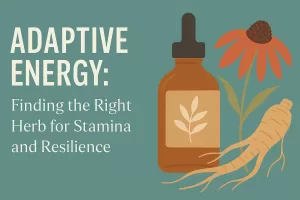
Fatigue doesn’t look the same in everyone. For some, it’s a heavy body that resists getting out of bed — even after what should have been a full night’s sleep. For others, it’s a mind that can’t concentrate, even with another cup of coffee. Some feel easily winded climbing stairs, while others describe a kind of burnout, where even small tasks feel overwhelming. The truth is, “low energy” has many textures — and each calls for a different kind of support.
What Is Adaptive Energy?
Most of what we call “energy” in modern life is really stimulation. Coffee, sugar, and quick boosts push the nervous system harder, often borrowing from tomorrow to get through today. Adaptogens work differently. They help the body generate what I call adaptive energy — energy that meets the moment, flexes with demands, and replenishes reserves over time.
In Chinese medicine, fatigue has many possible causes — from depleted reserves to imbalances in how the body transforms food and breath into energy. Adaptogens don’t just boost one pathway; they support the body more broadly, helping restore balance where it’s needed most.
Which Energy Herb Is Right?
Patients often ask me: “What’s the best herb for energy?” My answer is always the same: it depends on the kind of fatigue you’re experiencing. Here are a few distinct allies:
- Rhodiola → sharpens mental clarity and endurance, especially under pressure or at high altitude. Best for those who feel mentally foggy or drained by stress.
- Ashwagandha → calms the nervous system while restoring strength. Ideal for people who are wired-and-tired — exhausted yet unable to fully rest.
- Maca → supports stamina through hormonal balance, often used for libido, fertility, and energy tied to hormonal shifts.
- Cordyceps → strengthens lung capacity and physical endurance. Especially helpful for those recovering from illness or who fatigue easily with exertion.
- Astragalus → builds long-term resilience and immunity. A gentle tonic for those who feel depleted during seasonal transitions or catch every cold that goes around.
Practical Application
Think of these herbs not as interchangeable “energy pills” but as distinct companions. Match the herb to the pattern of your fatigue. For mental sharpness, Rhodiola may be best. For stress-induced depletion, Ashwagandha shines. For physical stamina, Cordyceps is the classic.
I often suggest starting with a single herb that resonates most with your needs and noticing how your body responds over several weeks. Adaptogens are not quick jolts — they work best through steady, consistent use.
Energy as a Dynamic, Not a Commodity
When we approach energy as something to buy, spend, or consume, we fall into the stimulant cycle. Adaptive energy asks a different question: What kind of vitality does this moment require, and how can I cultivate it sustainably?
Adaptogens remind us that energy is not one-dimensional. It can be sharp or steady, calming or activating, physical or mental. The art is in choosing the right ally at the right time.
If you experience fatigue this week, notice the texture of your fatigue. Is it heavy, foggy, restless, or tied to physical exertion? In the next post, I’ll explore the ginseng family — perhaps the most famous of all energy tonics — and how it’s different forms can support resilience in very different ways.
Author Note & Disclaimer
I am a doctor of East Asian medicine with clinical and risk management expertise. The information in this article is provided for general educational purposes only. It is not intended as medical advice and should not be used as a substitute for consultation with a qualified healthcare provider. Do not use this information to diagnose, treat, cure, or prevent any health condition. Always seek the guidance of your physician or another licensed healthcare professional before starting, changing, or discontinuing any herbal, dietary, or lifestyle regimen, especially if you are pregnant, breastfeeding, taking prescription medications, or managing a chronic illness.